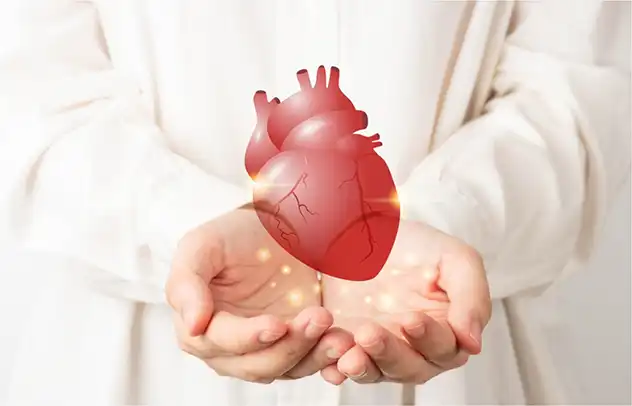Heart Failure and Heart Transplant
Specialty > Subspecialty > Heart Failure and Heart Transplant
At Aayush Hospitals, we evaluate and manage many heart conditions that may result in heart failure. Our multidisciplinary team consisting of cardiologists, cardiac surgeons, transplant surgeons, and nurses work closely to determine the best treatment strategy for each patient. We try our level best to resolve the conditions without needing to transplant. When needed, however, we also determine the course of action for heart transplantation.
Our expert team of heart surgeons and transplant surgeons guide patient through each step of their transplant journey. In addition, we also let our patients consult with psychologist to help them deal with stress and manage their heart condition.
At Aayush Hospitals, we are equipped with state-of-the-art infrastructure and advanced technological setup to treat patients with heart failure and other conditions that may require a heart transplant.
Our team of doctors are industry experts in treating complex heart conditions and transplants. With their expertise, we take pride in providing the best treatment outcome to all our patients.
With cutting-edge technology and expert care, you can rest assured that you are receiving the best treatment for even critical heart conditions and transplants at Aayush Hospitals.

Congestive heart failure or heart failure is a life-threatening condition during which your heart is unable to pump enough blood into your body.
What is Heart Failure?
Heart failure or Congestive heart failure is a life-threatening condition in which your heart cannot pump adequate blood to meet your body's requirements. Since the heart still works in this condition, the blood starts to accumulate in other parts of your body mostly in the legs, feet, and lungs.
What are the Symptoms of Heart Failure?
The common symptoms of heart failure include:
Chest pain.
Heart palpitations.
Shortness of breath.
Fatigue.
Swelling in abdomen, legs, and ankles.
Urgent need to urinate while resting.
Weight gain.
Nausea.
What Causes Heart Failure?
Heart failure may be caused by a variety of reasons including:
Heart attack or coronary artery disease.
Cardiomyopathy.
Congenital heart disease.
Diabetes.
Alcohol use.
Arrhythmias.
Kidney disease.
How is Heart Failure Treated or Managed?
The treatment for heart failure will depend entirely on the type of heart failure you have and the possible reason behind it. Upon conducting specific diagnostic tests, your lifestyle will be altered, and medications will be prescribed.
Heart failure cannot be cured. As the problem advances, your heart becomes weaker and pumps less blood to your organs. Since you cannot move back from this stage, treatment is aimed to keep you from moving forward and slow down this progression.
What are the Risks of Heart Failure Management?
You may experience a few complications due to the treatment, including:
Hypotension.
Infection due to frequent hospital visits.
Kidney failure.
Mechanical circulatory support includes various devices that help in making your heart function better.
What is Mechanical Circulatory Support?
Mechanical circulatory support or MCS consists of certain devices that improve your heart function. Consequently, improving your quality of life and survival.
The devices include:
Ventricular assist devices (VAD).
Extracorporeal membrane oxygenation (ECMO).
Intra-aortic balloon pump (IABP).
Depending on your need, the heart failure doctors in Gujrat will select the type of device.
What is Ventricular Assist Device (VAD)?
A ventricular assist device or VAD is a mechanical pump that helps your heart in pumping blood through the body. If your heart is weak or you need to recover from surgery, a VAD may be recommended.
What is Extracorporeal membrane oxygenation (ECMO)?
Extracorporeal membrane oxygenation or ECMO is a type of artificial life support that helps patients with impaired heart and lung functioning. ECMO continuously pumps blood out of your body and sends it through a device that adds oxygen removes carbon dioxide and pumps it back to your body.
What is Intra-aortic balloon pump (IABP)?
An intra-aortic balloon pump or IABP is a device that helps your heart to pump more blood.
Why Do You Need Mechanical Circulatory Support?
Based on your condition, our doctor may recommend any of the above devices. It may be required:
During or after heart surgery or a critical procedure.
While waiting for a heart transplant.
As a long-term treatment option.
What are the Risks of Mechanical Circulatory Support?
The risks with mechanical circulatory support are lesser. Common risks, however, include:
Infection.
Device failure.
Bleeding.
Blood clots.